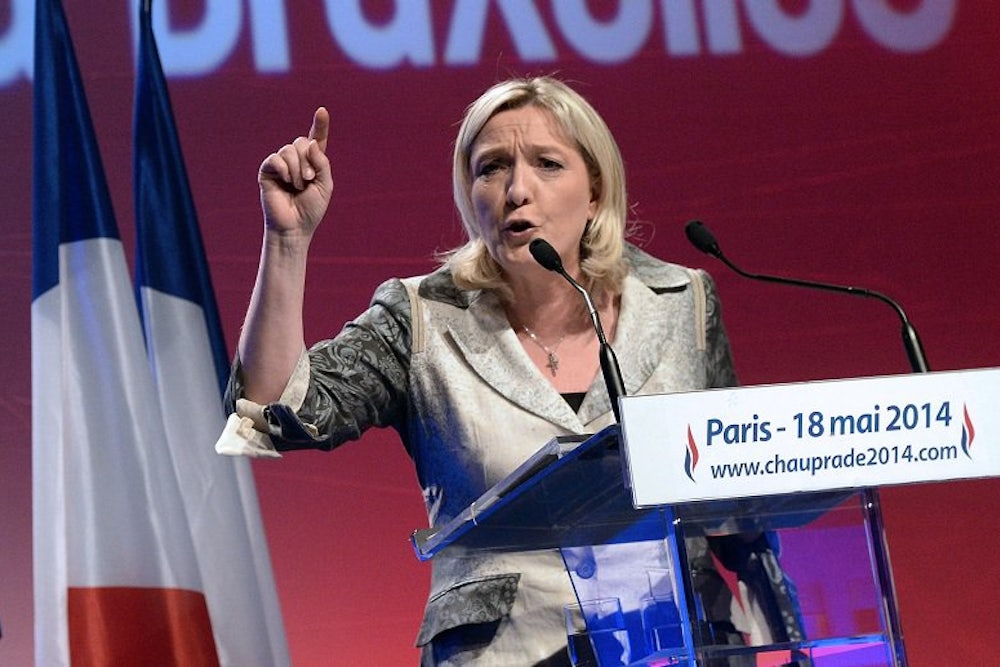At Vox Monday, Matt Yglesias penned a piece after reading the party platform of France’s far-right party, the National Front, and discovering that its critique of the European Union is correct. It took only a few minutes for Twitter to erupt in outrage:
i am smashing my head into the wall http://www.vox.com/2015/1/12/7531357/national-front-platform ...
—
davidlsims
Americans! Please do not treat the fascism in Europe as an intellectual curiosity to play devil's advocate with http://www.vox.com/2015/1/12/7531357/national-front-platform ...
—
alexhern
I'd hard to stay mad at Yglesias, he's like a brain-damaged kitten - so helpless, so slow, so innocent http://www.vox.com/2015/1/12/7531357/national-front-platform ...
—
alimhaider
You’ll notice that none of these tweets (or the many others you can find by searching Twitter) actually argue that Yglesias is wrong or that the National Front’s critique is incorrect. Instead, the implicit argument is that Yglesias shouldn’t even take the National Front’s platform seriously. That’s a mistake—and it indirectly makes the party stronger.
The National Front, which is led by Marine Le Pen, has extreme views on immigration and uses anti-Muslim vitriol for political advantage. That's presumably why French President Francois Hollande excluded Le Pen and her party from Sunday’s march against terrorism in Paris. As The New Republic's Elaine Teng explained, that was a mistake. It only further substantiated Le Pen’s message that the French government is not inclusive—a message that undermined the national unity march.
Conservatives mocking Yglesias and ignoring his economic argument are making a similar mistake. The National Front’s critique of the E.U. holds that the Eurozone's monetary union is an economic disaster and their solution is to break the whole thing apart. “They rightly say that the inability of Eurozone member states to conduct independent monetary policy ‘condemns the people to austerity plans that do nothing but exacerbate the crisis,’” Yglesias writes.
That has hurt the individual economies of all of the Eurozone countries. Due to Germany’s unfounded fears of inflation, the European Central Bank (ECB) has been hesitant to use unconventional monetary policy tools, like the Federal Reserve did with its large-scale asset purchases. It was been slow to cut short-term interest rates and even foolishly raised them in 2011 when oil prices rose. All of this has made it significantly harder for Greece, Italy, France and other E.U. nations to recover from the Great Recession. Instead, the ECB and European Commission have demanded strict “structural reforms”—spending cuts and tax increases—that have done little to fix the underlying issues in the economy and more to fuel political unrest.
Le Pen and other far-right leaders have taken advantage of that political unrest to expand their parties’ popularity. The best way to reduce their popularity is to strengthen the economy. In France, for instance, an improving economy would redirect the spotlight to the uglier sides of the National Front’s platform—the exact outcome liberals and conservatives should both want.
But that isn't happening because European leaders are still demanding those structural reforms without addressing the underlying problems with the Eurozone. Without such fixes, the National Front and other extreme parties will only gain more influence. That's what's happening in Greece, where the far-left party has surged in the polls. That threatens to reignite the Eurozone crisis.
Of course, it’s much more fun to mock Yglesias and Vox and deem that he must be wrong without considering the actual arguments in his piece or the implications of it. What’s a depression afflicting tens of millions of people in Europe anyways?
